#but the doctor remembering donna likes cold milk
Text
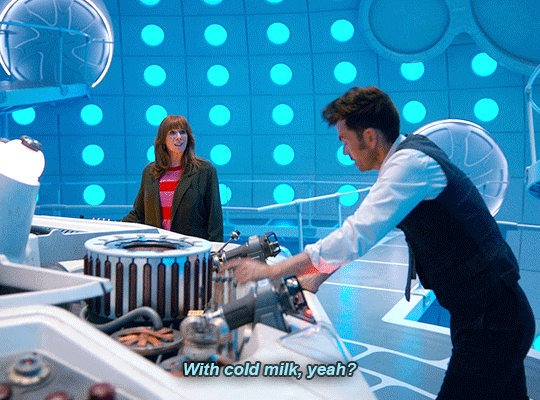

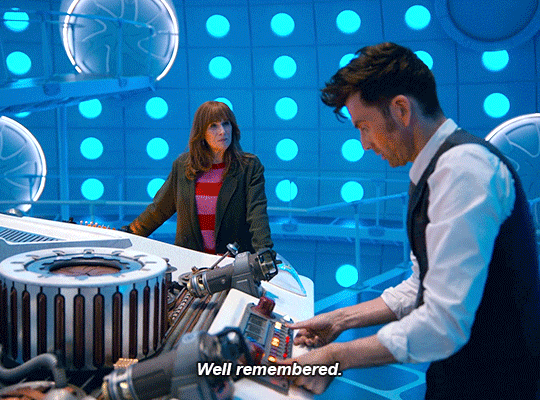
-- "I really do remember, though. Every second with you."
#i know donna spilling coffee was crack and so perfectly donna#but the doctor remembering donna likes cold milk#and not huon particles in her coffee#has me perfectly SOFT#doctor who#the star beast#my edits#doctor who spoilers#donna noble#dwedit#dailydw#catherine tate#david tennant#tvedit
2K notes
·
View notes
Text
To Survive this Pain, Part 1 - 11th Doctor x Reader
A/n: I'm not dead, I promise! I've just been struggling to finish off fics. If this seems slightly rushed it's because I just needed to finish something. It's exam season (it's extra-long now due to a certain virus), but they're over in a few weeks. I've been trying to stretch into writing for different Doctors, and in my new formats, but good old Eleven is easiest to write.
Inbox is still open :)
Word Count: 2596
Summary: After the "death" of Amy and Rory, the Doctor is devastated. After deciding to isolate himself on a cloud, he leaves you with the Paternoster Gang till Strax informs you the Doctor wants to see you.
Warnings: Angst, Cold Doctor, Doctor is slightly ooc due to guilt,
mild self-inflicted Injury, Bouts of Rage.
I should try to post part two as soon as possible.
This is my first ever Full Story (GIF isn't mine).

Your shoes splashed through puddles on the cobblestone road, on your way down to the park of which you knew he would be.
You hadn't heard from him in a short while now, but Jenny and Vastra frequently advising you to pay him a visit had been getting to you. That's why, when Strax brought you the news that the Doctor wanted to see you, you leapt at the opportunity.
You were worried, you'll admit. It was clear as day that losing Amy and Rory had him tearing himself to pieces. It was only a matter of time before he sent you off, too. Before he abandoned you.
Weaving around the quiet Victorian streets, the sun still yet to grace the sky, you had arrived at the park. Looking around the odd trees that decorated the perimeter, you picked out the tree that you knew had the elusive ladder directly above it. You stepped over the beds of wilting flowers that lined the pathways into the overgrown grass.
After completing the feat of reaching the ladders, consisting of either jumping or using your umbrella handle, you had successfully pulled the ladder down far enough to climb onto.
Making your way up the ice-cold rungs, you take a moment to consider why the Doctor called for you in the first place.
It made little sense to you. After all, the Doctor had been avoiding you for the better part of two months now; what had changed?
The Doctor planning on taking you home became all the more likely in your mind as you began to climb the spiral staircase, shivering as the late-autumn air nipped at your skin. Winter was slowly breaking through the remaining life.
If you weren't so hung up on adjusting to the less-than-ideal state of Victorian England, you would've had more time to worry about the Doctor. However, he was so hung up with his own issues, and you with yours, that he only crossed your mind when you were settling down for the night.
Of course, it hurt that you too. Never seeing Amy and Rory again. You did your best to hold onto the fact that they lived a happy life together.
A life that you knew could never have. You wish you could say goodbye to them, but you chose to carry the loss with you.
You were exhausted, it was safe to say. Spending your days helping out the Paternoster Gang with new cases that come in was certainly frustrating, especially when you had to avoid so much. Milk, green dyes, dodgy stairs, aliens and gas leaks. Nothing was safe in Victorian times.
Not that you didn't enjoy the company, mind you. Jenny always provided conversation, and paired with Vastra, there were plenty of investigations to be had. You just missed them all, sometimes.
The Doctor had become such a vital figure in your life that it didn't seem right for him to not be there. When you had both lost Donna, you were there for each other, and even then, he was a wreck. You had spent those first two months together, and you had never felt closer to someone before. At first, you couldn't admit it to yourself, but after six years, you knew that was when you started falling for him.
There was so much you didn't understand about him, yet so much he had begun to explain. You had seen and done so much together, places that surprised and scared the both of you. In distant worlds and ancient times, there lay so many memories that you had forgotten. Just another thing consumed by time.
A simple flip through your diaries would confirm that through all that, you admired him: mattering not which of his faces. You had accepted from the start that he was an unobtainable desire, no matter how you looked at it.
He was old, alien and a danger-magnet. Many considered the Doctor to be a God.
It upset you to know that the Doctor could never love you, not in the way you love him. Not in the way that he had shown you what love could be, what it should be. But that was what you had to expect from the Doctor.
You assumed that consistently losing those he loved must hurt immensely. You also imagine losing someone he could spend the rest of his lives with would leave another unfixable hole in his heart.
So it made sense to you that the Doctor would never willingly fall for a human. Your short life-spans and weak bodies meant that so much as a single bullet could rob you of your life.
The thought of what a state he must've been in at that very moment was disturbing, to say the least. You had seen the Doctor angry before, and it was not an easy sight.
His heart held so much pain, so much guilt.
After what felt like a good three minutes, you stepped off the staircase. Your shoes now emerged in a cloud, which could somehow keep you from plummeting into the streets below. You felt surprisingly light, almost like you were standing in a pit of feathers, yet some odd force kept you from losing your balance. Plucking your key out of your pocket, you press your hand against the door of the TARDIS. You unlock the door, pulling the key from the lock and stepping into the Console room.
You called out for him. After listening for a moment, you concluded that the Doctor must've been elsewhere.
The TARDIS was a glum sight. Most of the orange lights were dimmed: if functioning at all. A few even had fist-holes in them. There were what looked like hundreds of books cluttering the console, all of varying topics: The Time War, Time Lord Psychology, the History of the Universe, Earth History, Greatest War Losses. Some had bookmarks; others he had clearly tabbed.
Paper littered the glass flooring, each scribbled in several handwritings. They all clearly varied in ages and sizes, some a muddy brown, others a vivid white. Quite a lot were in small clusters of pages, as though they were ripped from a book. You picked up one of the sheets to inspect closer, and your heart nearly broke.
Each page had a sort of date in the corner, which you quickly realised must've been an approximation of the Doctor's age at the time. They were diary entries, ripped out and thrown in what you assumed to be a fit of rage.
The Doctors' tweed jacket had slipped off the console and onto the floor. The contents of his pockets spilt out onto the floor.
You leant to pick it up, grimacing at just how much he was carrying around. Throwing the jacket over the railing, you avoided stepping on any more pieces of paper.
"Tidy some of this, will you?" You addressed the TARDIS, a hand on the edge of the controls, "I'll go talk to him, where is he?" The TARDIS clicked and hummed in response, showing you a blueprint on the monitor, "The Library? Okay then."
Darting out of the Console Room, you attempt to discover the library as soon as possible. You vaguely remembered the three places the library is most likely to crop up. You went from there. Fortunately for you, you didn't have to go far before the library appeared.
You had always felt as though the library was too empty. Four stories of shelves filled with books, all visible from the ground floor, the rows of shelves created a sort of maze of titles and colours. The Doctor must've owned every single book in the galaxy, judging by the sheer size. Not to mention the several dozen or so empty seats. The library could easily hold thousands of people at once, yet there is rarely ever so much as a whisper.
You had a fair clue as to why the Doctor would be hiding away in there.
There the Doctor was, turned away from the door, in an intricately decorated armchair. You could just about make out the top of his head. You loomed behind him awkwardly, unsure or not if he was aware of your presence.
"Doctor?" You faltered. His head perked up slightly, and the Doctor strained out a hum. He stood up, his arms tiredly hanging at his sides after he stretched. It checked out with your fit of rage theory. The Doctor walked up to you, and you only then noticed how fraught he was.
His expression was tired, eyes sunken and lips pressed into a thin line. His shirt was unkempt: the sleeves were torn slightly. It also appeared burnt or covered in dust. His hands were covered in dust too.
However, you noticed that his right hand had quite a few cuts and gashes, which all seeped out orange-tinted blood.
His greenish-brown eyes search yours for a moment as a tear rolls down his cheek. He inhales deeply, nodding to himself.
"Look, I..." The Doctor paused, again glancing over into your eyes, "I'm sorry- I can't, I can't do this," He took in a trembling gasp for air, "I don't want to, but I can't keep doing this. I'm sick of it. I can't keep losing people. I'm so sick of saving the universe." Unsure of what to you, you reach a hand out to the Doctors. He puts a hand on top of yours, keeping the other, bloodier fist at his side. You brush your thumb over his knuckles, his hand hot against yours. The Doctor continues, "Everyone, everyone who travels with me leaves, or dies, and I'm always alone again. Alone and in pain. I can't keep doing this..."
Smiling sadly, you nod, "I understand," You looked back up at the Doctor, "If you called me here to convince me to go home-"
"Take you home?" The Doctor's voice cracked, "I could never. That'd be just as bad as losing you. I need you."
Oh, the Doctor have his way of making you feel important at the worst moments. Your insides bubbled giddily, but you refused to show it. Instead, you ignored it to the best of your ability; what he was saying was important.
Your attention had fallen back down to his hand, and it looked considerably worse than you initially thought. Pieces of glass dug into his knuckles, the skin seeming gnarled by the force of the oncoming storm, "Doctor, your hand,"
"It's fine." The Doctor seethed, staring numbly at you, "I'm not human, it's not going to kill me."
You wanted to protest. However, given the Doctor's already fragile temperament, you weren't going to push it. Instead, after an instant of silence, you asked a simple question, "How have you been, then?"
The Doctor blinked, giving an answer careful thought. He had an earnest grimace as he finally spoke, "Furious."
"I can see, that" You hum, putting equal thought into how you should approach your response, "What do you think you're going to do, now?"
"Stay here. I'm not getting involved anymore." The Doctor spat, pulling his hand away from yours, turning to sit down, "I don't want to care."
"That's fair enough." You reassure. You didn't like the sound of the Doctor retiring too much, but you respected his choice. If he didn't want to save the world, he doesn't have to. You hoped that, in his chosen conditions, he would heal.
You vowed to yourself at that moment that you'd do everything you could to help him. Starting with his physical injuries.
You heard the armchair squeak softly as the Doctor flopped back against it, picking up a book from the coffee table and beginning to read. You headed back over to the door and grabbed the small medkit from the bracket on the wall. You paced back to the Doctor, pulling a pouffe from a few feet away to sit on. The Doctor glared daggers at you, exhaling sharply and holding his arm out in your general direction. You thanked him meekly, beginning to remove the sharp, reinforced glass shards from his knuckles.
If you were new to travelling with the Doctor, you thought that seeing this might hurt you more. However, six years of travelling was more than enough for the two of you to be used to this sort of treatment. He never seemed to care much about his physical health, more about yours. That often ended up in you worrying about the Doctor, not that you minded. You supposed it worked out, as you both fussed over each other. If the Doctor's previous face saw how he was acting, you were sure he'd have a fit. Not that he mattered, as he was still a part of the man in front of you.
You could tell by the downtrodden way he pretended to read his book, staring a hole through it, that something was bothering him.
"Are you scared of me?" The Doctor halted, voice brittle. He had taken note of how delicate you were and had drawn it up to a fear that the Doctor would lash out at you.
"No," You shushed, focusing on removing the glass from his hands.
"You don't sound sure,"
"I am." You reassured bluntly, "I'm just being careful. I don't want to hurt you more."
"I'm not hurt! You don't need to fuss over me,"
You lifted your eyebrows slightly, "There's nothing wrong with feeling, Doctor. As you said yourself, feelings enhance life." The Doctor exhaled petulantly, eyes back on his book. "But not even you can be in pain forever."
"What is my alternative?" The Doctor strangled out, "I forget? I do something selfish?"
You grimace as you remove the last small shard from his pinky. You take out a clean cloth and some water, dampening the rag as you speak, "You're forced to survive this pain, this guilt, but you will grow from it. You make mistakes so that you learn from them."
You gently clear the blood from his hands and start to apply mild pressure to the deeper wounds. The two of you continued in silence, the Doctor only occasionally removing his hand to turn the page.
He was such a different person to the goofball front you were used to. He was melancholic. However, you would see a small amount of your Doctor bubbling to the surface. He would occasionally chuckle at the book he was reading or draw circles on your palm as you held his hand still. It provided you with enough comfort to know that you weren't wasting your time.
You finished up your last-minute medical care with a bandage around his hand. You closed the medkit.
"Alright, I'm just going to go restock this, then I'll go tidy up the paper in the console room,"
"Oh- right that... Must've been a mess. I'm sorry,"
"It's okay." You smiled pleasantly, "Come find me if you need me, okay? I won't be far,"
The Doctor caught your hand in his, just as you were about to leave, he tugged at your arm. You leant down, and the Doctor pressed a short kiss to your cheek. You countered with a kiss of your own on the middle of his forehead. Just like you used to, back with his previous incarnation.
As you wandered off, you were oblivious as to what that gesture meant. Was it a thank you? Another apology? Was it even platonic?
From behind you, you swore that he said something you thought you'd never hear the Doctor say.
#eleventh doctor x reader#11th doctor x reader#the doctor x reader#doctor who x reader#angst#part 1#crying#slight fluff
194 notes
·
View notes
Text
Kellogg’s Breakfast Revolution
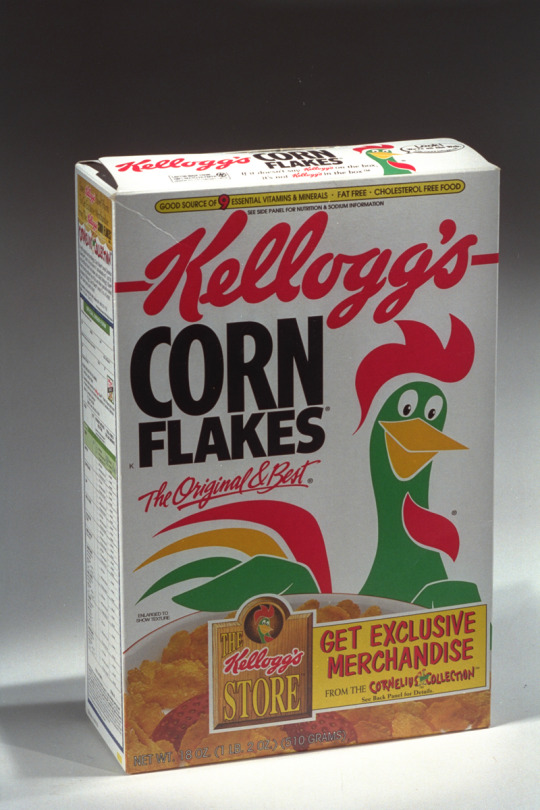
This 1995 Kellogg’s Corn Flakes box (96.34.3.13) features Cornelius Rooster, a popular character logo since the late 1950s. THF302682
Perhaps it could only happen in western Michigan: the combination of religious fervor, fertile soil to grow grains that could be transformed into easily digestible breakfast cereals, and the spirit that one could accomplish anything with hard work and determination. Out of this world came John Harvey (J.H.) and William Keith (W.K.) Kellogg—two brothers who would transform the way that Americans ate breakfast. They were, unfortunately, often at odds. And they didn’t work alone. But, through their persistence and combined efforts, the dry cereal flakes they perfected would start a breakfast revolution.
Into the early 20th century, the American breakfast was often heavy, starchy, salty, and fatty—laden with leftovers from last night’s dinner, like cured meats, day-old biscuits, and lard-fried potatoes. No wonder that one of the most common complaints of the time was “dyspepsia”—a term that applied to a medley of stomach ailments, including constipation, diarrhea, heartburn, and indigestion. For the sick and the elderly, lengthy cooking of porridges or gruels was the only morning-meal alternative.
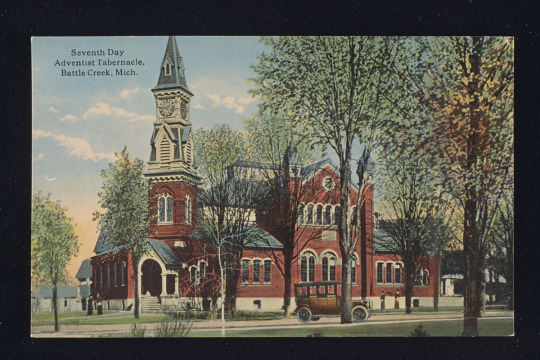
Seventh-day Adventist Tabernacle, Battle Creek, Michigan, 1914 (99.146.39). THF316219
The Kellogg brothers—John Harvey (1852-1943) and his younger brother Will Keith (1860-1951)—grew up in the close-knit community of Battle Creek, Michigan, a center for the Seventh-day Adventist Church. Members of this homegrown Christian religious sect not only believed in the connection between spiritual and physical health, but also that healthy living depended upon maintaining a nutritious vegetable- and grain-based diet.
Seventh-day Adventist leaders Ellen and James White hand-picked J.H. Kellogg to run their medical and health programs in Battle Creek, and ultimately sent him to the prestigious Bellevue Hospital Medical College in New York City. It was during his morning rush to classes at Bellevue that he began thinking about creating a nutritious, ready-to-eat cereal.
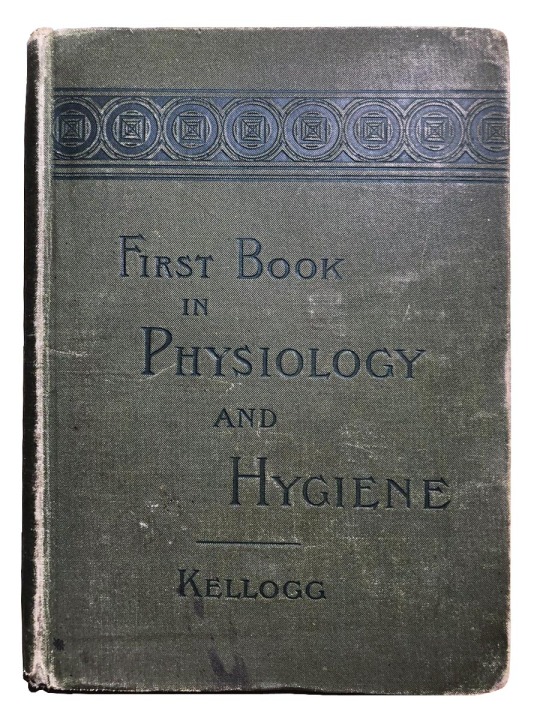
In 1888, Dr. John Harvey Kellogg authored this book (29.1119.14), aimed at explaining to young people, “in clear and simple language,” the structure and functions of the human body as well as his personal philosophy for healthful living. THF183317
Upon returning to Battle Creek in 1876, Dr. J.H. Kellogg assumed leadership of the Whites’ Western Health Reform Institute. But his vision was much larger than theirs, ultimately leading to his breaking ties with his Seventh-day Adventist backers. With the able (but underappreciated) assistance of his brother, Will, to run the business end of things, Dr. Kellogg turned the Whites’ once-modest institution into the grand Battle Creek Sanitarium. Nicknamed the San, this “university of health” would become a world-famous health resort, catering to the rich and famous (including Henry Ford) as well as the truly ill. At the San, Dr. Kellogg would profess and put into practice his long-held philosophy of “biologic living”—that is, the belief that correct eating and drinking, plenty of exercise, hydrotherapy, and the abstinence of tobacco would lead to a healthy mind, body, and spirit.

Corn Flakes loom large in this postcard (94.82.4) showing the packing room at the Kellogg’s plant, about 1935. THF320131
The true origin of corn flakes is difficult to trace, as competing versions of it have been offered by Dr. Kellogg’s wife Ella (whose dedicated assistance was integral to the San’s food operations), his brother Will, other family members, and San employees. All agree, however, that it started with Dr. Kellogg’s correct hypothesis that a grain-based cereal would be easier to digest if the grain’s starch was broken down through a pre-cooking process. (Ironically, nutritionists now agree that easy digestibility is less healthful than the slower-to-digest high-fiber cereals that are so popular today.) Hours of experimentation and a little accidental fermentation finally led to the creation of an easily digestible flaked cereal made of wheat. Patients at the San loved it and mail-order demand (usually by former patients) soon exceeded supply. Dr. Kellogg felt that he had accomplished what he had set out to do.
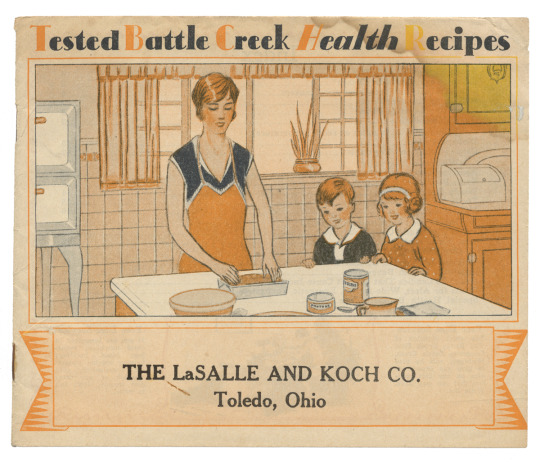
Recipes for health foods that Dr. J.H. Kellogg served his patients at the San were featured in this 1928 booklet (95.174.22) aimed at the general public. THF17004
But his younger brother Will was far from done. Will saw a raft of competitors scrambling to introduce their own—often very similar—flaked breakfast cereals and making money off of their original idea. Whereas his brother, the doctor, was satisfied with continuing to produce healthy, nutritious foods for his niche group of patients, Will saw an opportunity to market a light, healthy breakfast cereal to a much larger public. After helping his brother rebuild the San following a devastating fire in 1902, he bought the rights to the flaked cereal and struck out on his own.
Will immediately made some changes to the initial cereal his brother was serving at the San. He replaced the wheat with cheap, plentiful, better-tasting corn, and added (to his brother’s horror) malt, sugar, and salt to make the cereal more palatable to the general public. In 1906, Will Kellogg founded the Battle Creek Toasted Corn Flake Company and the cereal we know today as Corn Flakes was born.
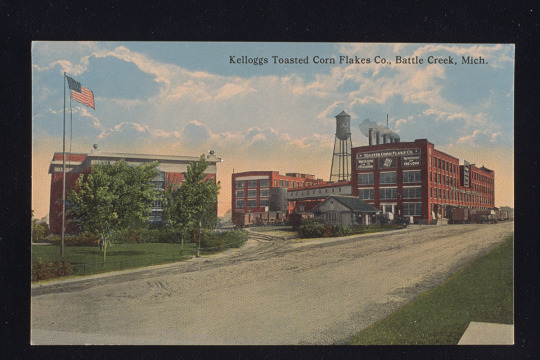
A postcard (99.146.41) of the Kellogg’s factory in 1914. THF316221
Will’s business acumen kicked in, as he embraced ever more sophisticated forms of advertising and packaging, as well as the most up-to-date machinery, factory practices, modes of communication, and distribution networks. By adding his signature to the front of each cereal box, he guaranteed the quality of his products to the public while also—once and for all—staking his claim to them. By 1909, the company was producing and shipping 120,000 cases of Corn Flakes every day!
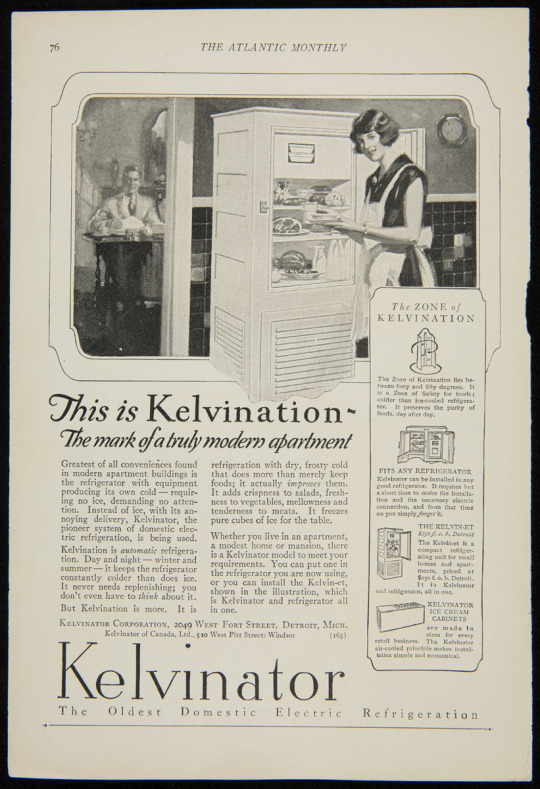
The popularity of dried cereal flakes for breakfast was in part due to improvements in both safe-to-drink milk and electric refrigerators (as shown in this 1925 ad, 2019.0.3.1) to keep the milk cold. THF290841
During Will’s active years of running the company—from 1906 to 1939—Kellogg’s became a national and ultimately global brand. These years also coincided with the growth of self-service grocery stores—in which name brand products and eye-catching packages were key to customer purchasing decisions. The success of Kellogg’s cereals was also aided by improvements in safe, pasteurized milk and the increasing popularity of electric refrigerators to keep the milk fresh.

In 1949, consumers who sent in a Kellogg’s Rice Krispies box top and 15 cents could receive this Snap! cloth doll kit (72.177.618.1). THF300027
Through Will’s leadership, the company continued to embrace new methods of advertising—cereal box coupons and giveaways, catchy jingles and character logos, colorful print ads, recipe booklets, and radio advertising. By 1939, Kellogg’s controlled over 40% of the ready-to-eat cereal business in the United States and over 50% of the business outside the U.S.
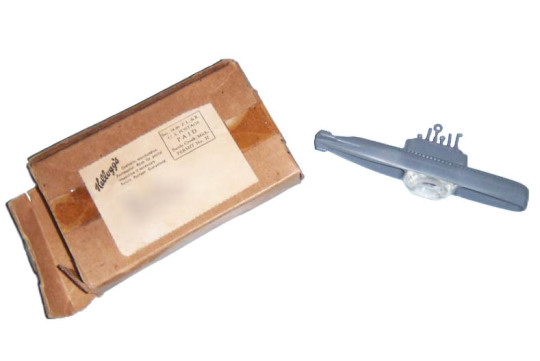
The owner of this 1950s U.S.S. Nautilus submarine toy (2015.35.47) remembered sending in 25 cents and a box top from either Kellogg’s Sugar Smacks or Sugar Corn Pops to receive it through the mail. THF183318
After Will stepped down, the company continued the aggressive marketing for which it had long been known. TV commercials and sponsorships replaced those previously on radio. Facing stiff competition from other cereal companies after World War II, Kellogg’s veered from its traditional reputation for healthful cereals and introduced a succession of sugar-loaded cereals for the new Baby Boomer market. Iconic new character logos helped promote them, like Tony the Tiger (introduced with Sugar Frosted Flakes in 1952) and Toucan Sam (introduced with Froot Loops in 1963).
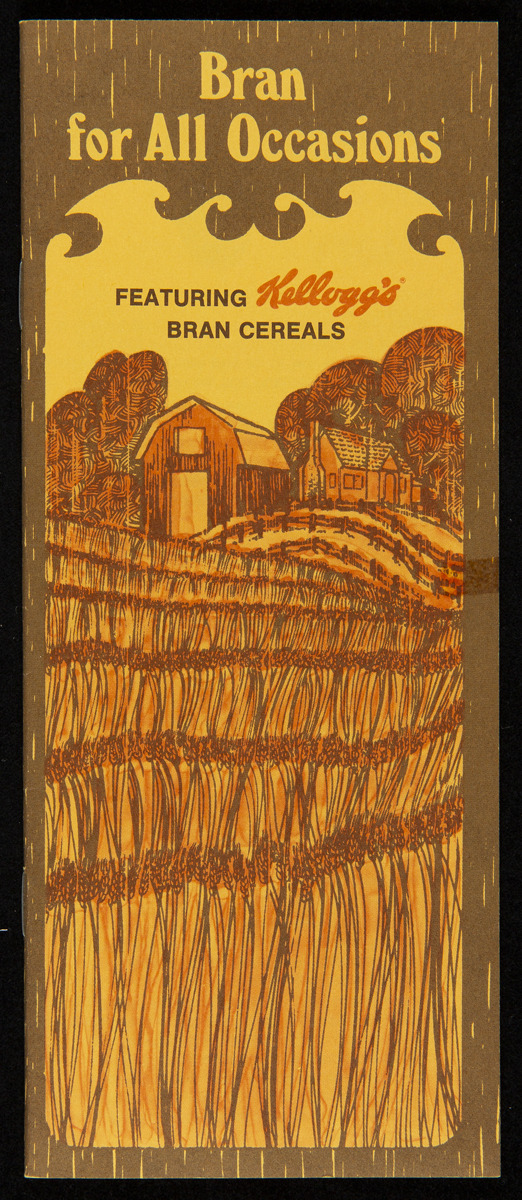
The interest in “natural foods” in the 1970s and 1980s included healthful grains that, ironically, Kellogg’s had initially promoted—like those in the bran cereals featured as ingredients in this circa 1982 recipe booklet (92.256.9). THF296229
For Kellogg’s and other cereal companies, pre-sweetened and classic cereals would dominate the market during the 1950s and 1960s. But, in 1972, following a trend toward more “natural” foods, a little-known company named Pet, Inc., achieved breakout success with its Heartland Natural Cereal. Mainstream cereal companies scrambled to introduce their own versions of “natural” cereals, including Kellogg’s contribution, Country Morning Natural Cereal (1975–80). The trend toward more healthful and nutritious cereals brought Kellogg’s full circle back to its roots and continues to be popular today.
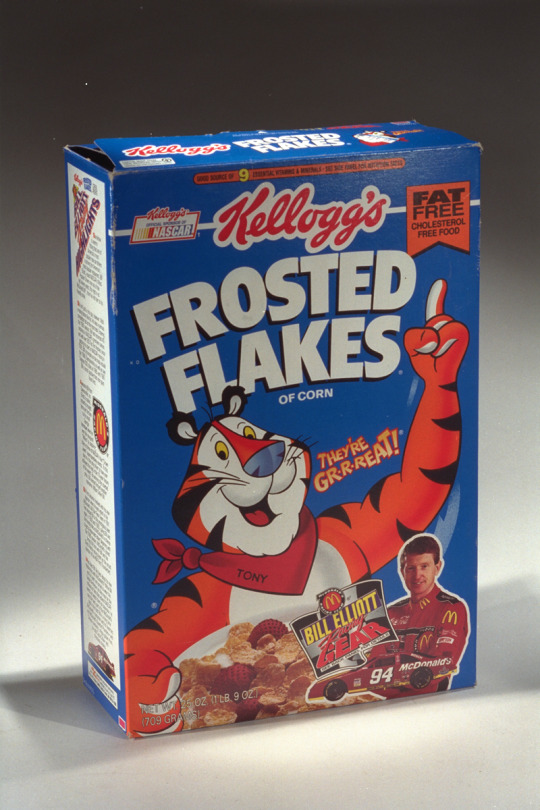
The front of this 1990s Frosted Flakes box (96.34.3.15) both features popular character logo Tony the Tiger and alludes to Kellogg’s sponsorship of NASCAR. In keeping with the times, this pre-sweetened cereal also claims to be fat-free, cholesterol-free, and include nine essential vitamins and minerals. THF302680
Too few people today recall the names of the two Kellogg brothers who started the breakfast revolution with their toasted flake cereal some 120 years ago. But it is impossible to ignore the legacy of their contribution. Through their lifetimes, Dr. J.H. Kellogg promoted healthful living, while his brother, W.K., convinced consumers that breakfast was the most important meal of the day. Meanwhile, the familiar character logos and advertising jingles for which Kellogg’s has long been famous remain in our heads and hearts.
For more reading, see: The Kelloggs: The Battling Brothers of Battle Creek, by Howard Markel (2017) and The Great American Cereal Book: How Breakfast Got Its Crunch, by Marty Gitlin and Topher Ellis (2011).
Donna R. Braden, Senior Curator and Curator of Public Life at The Henry Ford, fondly remembers watching all those Corn Flakes commercials when Kellogg’s sponsored her favorite pre-teen TV show, The Monkees.
#1 Ford Daily | Đại lý – Showroom ủy quyền Ford Việt Nam 2019 Ford Daily là showroom, đại lý Ford lớn nhất Việt Nam: Chuyên phân phối xe ô tô FORD như: EcoSport ✅ Everest ✅ Explorer ✅ Focus ✅ Ranger… [email protected] 6A Đường Trần Hưng Đạo, Phường Phạm Ngũ Lão, Quận 1, Hồ Chí Minh 711240 0901333373 https://forddaily.com/ https://forddaily.com/xe/ https://forddaily.com/dai-ly/ https://forddaily.com/bang-gia/ https://forddaily.com/tra-gop/ #forddaily #dailyfordhcm #fordshowroomhcm https://www.google.com/maps/place/Ford+Daily/@10.7693359,106.696211,15z/data=!4m5!3m4!1s0x0:0x1f188a05d927f4ff!8m2!3d10.7693359!4d106.696211
0 notes